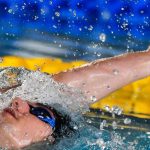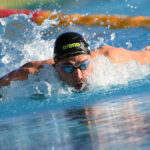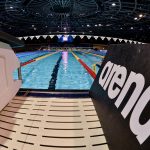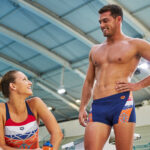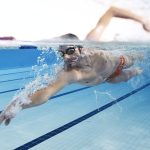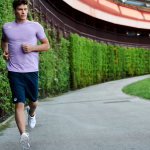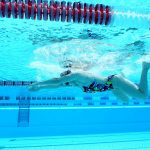Fred Vergnoux talks Barcelona and Spain’s ‘número uno’ Mireia Belmonte

Q: Is Spain ready to step up at a home World Championships in Barcelona and what would constitute success?
A: Spain is always proud to organize an international competition. After the success of the (1992) Olympic Games and the success of Barcelona 2003 (FINA World Championships), Spain has to raise the bar even higher, so they are ready to put on a well-organized competition that will be exciting to watch. With the diving competition against the backdrop of the city, open-water in the port – I went to the test event a couple of weeks ago, and it was just amazing to see the swimmers racing in the port – and swimming in the basketball arena (Palau Sant Jordi), everything will be well-organized to show what Spain is capable of.
As for the swimming team, we have focused on how we can improve on the swims from the trials in Pontevedra for the Championships. With our team philosophy we know we can create chances to make the semi-finals, get to the finals, and maybe even win medals, and we want to be sure that we do everything on a daily basis to make the swimmers faster in the 16 weeks we have for preparation. Through this focus I think we will create more possibilities. Obviously within the team we have individuals such as Mireia (Belmonte), Rafa Muñoz, Melani Costa, Erika Villaécija, and Aschwin Wildeboer, who will be aiming for more than the final (of their main events).
Q: Is there a sense of excitement about the championships in Barcelona and what level of expectation do you sense in Spain in terms of what the host-nations swimmers might achieve?
A: They expect some good results, they expect to see as many swimmers as possible in finals, they expect the top swimmers to win medals, to be on the podium and perhaps even listen to the national anthem. Sport is important in Spain, the Spaniards enjoy both playing and watching sport, and there’s always something going on in Barcelona – Formula 1, handball, basketball, and of course now swimming. It’s a very cosmopolitan city, and I think they are looking forward to seeing what we can produce.
There is a big focus in Barcelona on the Championships, and that of course can be a good thing and a bad thing. It’s a good thing because usually the year after the Olympics it’s difficult to get back to work and to refocus on preparation, selection policies, get back to racing, and so it’s been a good situation for us (to regain our focus). On the other hand there’s a bit of pressure, we have to do well, so we don’t talk about it, we don’t focus on it, but the reality is that people expect us to do well. Of course this is normal, it’s a major investment, and while the World Championships is obviously not the Olympics it’s still a huge amount of work and investment, not just from the organizing committee, but also from the (Spanish Swimming) Federation, the city of Barcelona, and the many volunteers. There will be a lot of schoolkids going to the morning sessions to watch the heats, and so it’s not just the swimming community involved, it’s a lot more than that. Of course there will also be many people going to visit Barcelona at the end of July to have a good time, and with the World Championships going on at the same time, it’s going to be exciting.
Q: All Spanish eyes will be on Mireia, a proven force at the highest of levels. This will be the first big home – and home-base city at that – international of her career. How do you think she will handle it – and how does she respond to what some might describe as “pressure”? And what about you, the guide to Spain’s biggest swimming asset: nervous?

A: I think that the step Mireia made last year gave her not necessarily confidence but the capacity to step back and observe the situation with a different mindset. So yes she knows it’s a home World Championship and yes she knows she’s the number one swimmer in Spain, yes she knows that she made history because she’s the only swimmer that trained in Spain to win Olympic medals, and everybody is expecting Mireia to win. She knows all of this but we never speak about it, we’ve never had a conversation about it – maybe at the beginning of the year in January 2013 we said “This is what’s going to happen” and she said “Yes, I know” – and we are just focusing on the preparation. That’s what we did last year, that’s what we are trying to reproduce, because the way we did it last year is a working formula, and we’re just repeating the same – focus on the preparation, enjoy the experience as much as possible, and when it’s time to race, race the best you can.
Q: London might have been a little different, here she’s in front of her home town, so the thoughts must pass through her mind that there is a level of expectation. So even though you don’t speak about it do you think she’s able to put it out of her mind and simply focus on getting ready to perform?
A: Yes, I think it’s the case because we want to turn that into a positive situation. We don’t want to say that half of the people at the pool are Spanish and they want you to win a medal and do well, and you must do this and you must do that. We’d rather say that half of the people at the pool are cheering for you and supporting you, you need to take that energy and turn it into being faster in the water or a faster reaction off the block or a faster last 25. We really want to turn it into a positive moment and walk on air – if it’s a heat or semi-final or final and the crowd is cheering for you, it’s probably the best energy you can absorb.
Q: And what about you, the guide to Spain’s biggest swimming asset: nervous?
A: I used to be, but I’m not any more. (Having said that,) I still get really nervous during a final or an important moment when the swimmer has to produce a particular time. The coach that tells you he doesn’t get nervous is a lair, we get nervous, I try to keep the bad nerves to myself and use the good ones to egg my swimmers on. For me it’s a challenge to reproduce what we did last year with Mireia in Barcelona, being at home, and to make people happy. People have said to me “Fred that would be amazing if Mireia could would a medal, that would be fantastic, we’ll be so happy.” A lot of people say this, it’s not just about winning a medal or swimming this or that time, it’s about making people happy. For me to be part of this is enjoyable, it’s a challenge and I’m doing my best to take it on. Of course some nervousness is good and as a coach that’s what I’m looking for, because first of all with Mireia we’re going to have the opportunity to race in Barcelona probably only once, and with the relationship we have we want to enjoy the experience. But also we have to take (the opportunity) as much as possible and use that energy for yourself. Us coaches – and even the swimmers – really enjoy the sort of nerves you get once a year if you’re lucky, maybe it’s only once every four years. So it’s exciting, this is what we want, we want to get nervous, we want to not sleep the day before a final, we want to enjoy the last coffee together before going into the calling room, that sort of thing.
Q: Given that these will be home world championships, how has that affected, if at all, your long-term cyclical planning for Rio 2016?
A: It’s actually a pretty good situation in terms of the timing because the fact that we have the World Championships in Barcelona has allowed me to refocus pretty quickly after the Olympics, and say “Look we cannot mess up, it’s the World Championships and we need to perform.” So it was good for me to put the swimmers back into training and to recognize those who wanted to get back to work and those that didn’t. So I made some pretty hard choices, I had to split the group that I’ve had for the past two years and focus on the ones that want to go for it.
From an Olympic perspective, it gives me more flexibility for the year coming up. For example, next year we’re not going to worry too much about racing, we’re not to worry too much about times or getting close to a world record or being top-ranked in so many events. We’re just going to keep training, obviously, and keep the same amount of urgency in what we do. But if we want to do open water, we will do open water, if we want to race internationally, we’ll go and do some travelling, we’re going to really enjoy the swimming season, and then (after that) we have two years when we’re going to focus on the preparation for Rio.
Q: Mireia lived through a time of disruption after winning two silver medals at London 2012. Were you in touch with her during that period and what advice, if any, were you able to give to her?
A: Yes, we were in touch, I saw her a couple of times, we had a few chats, we were on the phone and a couple of times on WhatsApp (Messenger). It’s been complicated, it’s not been easy but the good thing about the whole situation is that Mireia knew what she wanted, she needed to have a break and do her own thing, try different things – she went to France to try out different coaching – she needed the time to reflect. It takes time, you cannot do this in a week or two. I said “Mireia you need to enjoy what you’ve done, you need to celebrate your success.” She needed time to make up her mind, that took about four months, and in the end she came back to square one – she went to look at something else, it didn’t work, she probably needed time to realize that what she had been doing was a working formula if I can put it that way, and she came back to step one. It was very important for her to reflect on what she’d done, I think that was the key for Mireia after the Olympics.
You need to understand one thing as well, and for me it’s very interesting because I’ve coached in the UK and the English culture. Here in Spain or France or Italy it’s very, very different. We live on emotions, we live through relationships, and a situation that you can deal with in 10 seconds with a British swimmer is going to take months with somebody else (here). Everything’s about love, passion, I hate you, I like you, it’s the way Mediterranean people are. It all comes down to emotions, when I was in the UK it was a bit more logical. So it was interesting (and necessary) for her to reflect and that’s what she did.
Q: So for you it was important to give Mireia her own space, to work it out for herself, and in the long run it has resolved itself. Now she is happy again, so it has turned out finally in a positive way.
A: Yes, it was difficult and yet everything finished well. If Mireia is happy, she can do anything. Last year at the Olympics she was happy, she really enjoyed the experience, she stuck to the plan from Day One to Day Eight, she was very professional, but she was a happy camper. She didn’t have that in September-October, she wasn’t happy with what she was doing, she didn’t really want to be back training full-time, and she was enjoying different things – media, fashion, going out, friends, family. All of this takes time, but it’s not permanent, and there comes a day when you realize “Now I have to go back to the pool and work.”
Q: What was Mireia’s level of fitness like when she returned to training with you – and what did you have to do to get back to the kind of level she was at on the way to London 2012?
A: I was expecting Mireia to be not so good in the water and pretty good on land, but in fact it was the reverse, and I was surprised. She was actually pretty good in the water and not so good on land, which, at the end of the day, is probably better, because she swims multiple events and she’s more of an aerobic swimmer than a sprinter. Having said that, she’s done some training, she’s swum at the national training centre at Sant Cugat, where the coaches there did a good job with her, and all I did was put her back to work in the water and start to get her fit in the gym.
Q: You are known for favouring cross-training and getting your swimmers fit not only in water but in other environments. Can you tell us what exercises/activities you get your squad to do beyond the pool – and what benefits stem from that (i.e.,. why do it)?
A: My thinking is that a swimmer is an athlete first, so we don’t just swim, we do a lot of different sports. Staying (only) in the pool, you miss a lot of opportunities. Getting stronger and fitter is difficult if you just stay in the pool. If you want to get strong, you need to go to the gym to lift weights, if you want to get fit you need to do some conditioning. Here typical training includes twice a day in the pool, but we also do something on land twice a day, including running, rowing, cross-country skiing, biking, cross-fit with weight-lifting, strengthening and conditioning, core work, medicine ball, many different things. The idea behind this is first of all to get strong – and you must lift weights to get strong, whether you’re going to do repetitions, weight 90%, 100% of maximum repetition, body weight – and try to get a high level of fitness in order to be able to recover better. In the case of Mireia, at the World Champs she’s going to race every day, and for example on Day One she could race four times with 200 medley and 400 free. So if you have a high level of fitness, you can recover faster and better, and will be able to swim at a high level more often.
Q: In this final countdown to Barcelona, has Mireia got back to where she was a year ago?
A: I would say that she’s probably better than (this time) last year in the pool, and more or less the same in the gym. I think last year she was a little stronger going into the Olympics than this year, but only in some aspects of what we do outside of the pool, not everything. I think she was fitter on the cross-fit, she was probably running better than now, she was probably better on things like body-weight exercises. This year she’s pretty good in core work, she’s pretty good in weight-lifting, heavy-weight stuff, but in the water she’s swimming better than last year.
Q: Mireia has a big and diverse program to get through: is there a “priority” event (what is that and why) or are all things equal?
A: I think they’re all the same, although there’s a natural priority that emerged from the results of the Olympics. Freestyle and butterfly are kind of important, but I would not say they’re more important than the others because the way we approach it is to try and keep the card open without imposing any limits on Mireia, so if it doesn’t go well on Day One there’s still Day Two and Day Three, etc. That’s what happened at the Olympics – if we had focused on two or three events we would have missed out on medals for sure. As Mireia’s coach I think the 800 free, 400 free, 200 fly is a very good combo, from a training perspective it really works well together. Mixing distance and medley, why not, even though 200 medley is a very, very specific race, and it’s difficult. But at the moment we’re keeping everything open. If we speak again in a year I’ll probably tell you something new (different).
Q: Which event does she like best – and which least?
A: Probably the ones that she likes least are the 800 free and 1500 free, but that’s just because she’s not very experienced – even though she won a medal (in 800 free) – and it’s not something that she used to swim. She has a lot more experience in 200 fly and 200 and 400 medley because that’s what she’s done for many years, so she has more confidence in those events, even though now she knows that she’s had more success in freestyle and fly than medley. I think the ones that she really loves to race are the 200 fly and the 200 and 400 medley, and my guess is that she’s going to start enjoying 400 free more and more.
Q: Can you describe what Mireia is like to work with? (ie., Does she have a high work ethic; does she question what she is asked to do; is she always engaged; is she fun to work with; is she challenging to work with)?
A: She’s very professional, she really enjoys training, she always arrives on or ahead of time, she never arrives late for a training session. She does what she has to do, and sometimes asks for more. She really fights (works hard), and just last night she was faster than the boys. All coaches would like to have a Mireia Belmonte in their squad, she’s fantastic. Another good thing with Mireia is that at the end of pretty much every session she comes to see me, and we talk for anything from 10 seconds to half-an-hour. “What do think about this, what about that set, maybe I should do better?” She’s involved in her swimming, there are some swimmers who finish the session and they leave (right away), but it’s important for her (to be involved).
Q: You’ve just highlighted some of her strengths, is there room for improvement in other areas?
A: She could be faster, so speed is something we will have to look at, because she’s more like a consistent swimmer than a split swimmer, and she can develop (more) speed. We still need to do a lot of work underwater – she’s pretty good underwater, but still that’s something that we could improve a lot. She’s not a very tall swimmer, so she could also work on technique – her butterfly is pretty good, her freestyle is pretty good, but we can improve her breaststroke and backstroke. There’s also a lot of work to do on land – she’s made a lot of progress, and I remember the first time we went to the gym she couldn’t do any pull-ups, now she can do many with 10/15 kilo weights on her legs. So there’s been a lot of improvement but still there’s a long way to go with the land work. So for a coach it’s exciting and for her to know that she can still improve it’s exciting, and the future is bright for Mireia if she keeps doing what she’s doing now.
Q: In general, how do you assess progress at the squad in Sabadell? Is there a specific or favoured set you like to use to test the swimmers – and if so, could you share it with us?
A: We’ve worked with a fairly big group from the end of August/1st September to the trials (in spring 2013), and I coach from 50 free to 25km and even more – we have two guys who do the World cup 88km. So it’s a very open group from the age of 17 to 32 years old, and I think that’s the strength of the Sabadell group. With the diversity and experience that we have, everybody has their own target, and everybody comes to train knowing what they want. The philosophy of what we do is pretty much based on hard work and being involved in the club. For me personally, I think I could probably coach in one or two places in Spain, but not many, and I got lucky to end up in Sabadell, coming in behind the legacy of Paulus Wildeboer. Paulus and I have a similar philosophy, although we do some things differently, and there are things that he does and I don’t and vice versa. But the overall philosophy is the same so for me it’s been a stroke of luck to be coaching at Sabadell after Paulus. There’s nothing much I can tell you about a specific training set – the Sabadell kids sometimes do 400 butterfly or 800 medley in competitions, things like that. We like to go and race open water, or take part in a 10km run in Sabadell or Barcelona, and just challenge ourselves every day.
Q: How many of your swimmers from Sabadell will be swimming at the World Championships?
A: There will be six, including Mireia, Judit Ignacio (100 & 200 butterfly), Marc Sanchez (800 & 1500 free), Aschwin Wildeboer (50, 100, 200 backstroke), a swimmer from Argentina (freestyle & backstroke), and a guy swimming the open water.
Last year we were very proud to have 8 swimmers going to the Olympics, including two 18-year-old girls participating in the Olympics for the first time – Judit (Ignacio) and (Claudia) Dasca – so for me that was quite a big achievement. We took a photo at the end of the Olympics and I’m sure everybody has it hanging somewhere in the house. We’re not like some big American programs, we’re just a normal club, so last year I think we did pretty well.
The Olympic trials last year in Malaga was an amazing competition for us and for the Spanish team. We talked about emotion earlier, and it was just different (in Malaga). My assistant coach was crying every time one of our swimmers made the cut, the swimmers were cheering, the national performance director was jumping up and down in his chair, it was really enjoyable. This year it was lower key, but knowing that it was for the World Champs in Barcelona, it was still pretty tense – one of the girls made the 200 fly cut by 0.01, and I had to refocus everyone again after that.
I’m really looking forward to going back into the (World Championships) arena and to feel that tension. I was speaking to a colleague a few days ago, for us it’s a drug, it’s the drug that we want, and we can only get it on very few occasions. Now it’s coming, and if the World Champs could be tomorrow, I would sign up for them right now.
As I said before, the timing (of the World Champs) is really good for us. If we do well in Barcelona then we can do things differently (next year). As a coach I’m looking forward to next year and trying new things. I talked earlier about speed and doing different types of work in the gym. We actually started here in Sierra Nevada (at the Spanish pre-Worlds training camp) doing something new that I think nobody else has done – we are using an ergometer, a rowing machine which we’re using like a swimming bench to reproduce the butterfly movement, and measuring things like intensity and velocity. As I said, next year is not about not training or taking a holiday, it’s about doing things differently. For a coach it’s very exciting to be able to do some experimentation because that’s something that we lack in our daily life.
For me coaching is a passion. When we had a team meeting the other day I told the swimmers that probably number one for me is the relationship, from the psychology with the swimmers and the way you talk and try to convince them that they can do it, to the 20 minutes before the calling room. Number two is probably how I can make my swimmers better – constant thinking, constant feedback, asking if that’s the best I can give my swimmer: was that session the best that I could give them today, this morning, tonight, or can I do better? Why is Mireia not doing this or that, how can I improve? If you get on top of that, people from the science field can then make you think even more, it’s amazing.
Written by:
Duncan Campbell
Duncan Campbell is a freelance writer with South African roots, a few travel tales, and a career that has been generous in its diversity. His journeys have taken him through swaths of North, Central, and South America, chunks of eastern and southern Africa, bites of Western Europe, and a vast region within himself. Having spent 19 years living in and traveling from the US, in 2006 he moved to Le Marche, central Italy, where he has pitched his tent with his German wife and American son.
